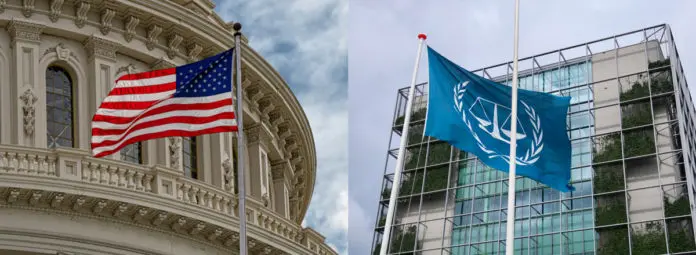- P.O. Box: 11482 Yaoundé, Cameroon; Headquarters: Efoulan, Yaoundé 3
- contact@caessinternational.org

When the Sparrowhawk Targets the Eagle: How the ICC Cannot Stand Up to the CIA’s Power
Indeed, the International Criminal Court (ICC), officially citing “limited resources,” has abandoned prosecutions against the United States regarding the CIA’s secret prisons. This comes in a context where the ICC is reopening its investigation into crimes against humanity committed in Afghanistan, now focusing solely on the Taliban and the Islamic State Khorasan Province (ISKP), the Afghan branch of the jihadist international network.
This abandonment of the investigation coincides with the recent political changes in Afghanistan and the country’s regime shift. Consequently, the inquiry into the CIA secret prisons has shifted trajectory towards allegations of indiscriminate attacks on civilians, targeted extrajudicial executions, persecution of women and girls, crimes against children, and other offenses affecting the general civilian population, allegedly committed by ISKP.
Between 2003 and 2004, the Americans built prisons at Bagram Air Base where detainees linked to Al-Qaeda and ISIS were held and reportedly subjected to torture, rape, and sexual violence.
Elsewhere, the CIA also established secret prisons, notably in the early 2000s in Poland, Romania, and Lithuania.

Chart on the Three (03) Main Stages of the Process for Handling Prisoners Linked to Al-Qaeda and the Taliban in Afghanistan Since 2003 by U.S. Forces
Although the United States has not ratified the Rome Statute establishing the ICC, it nevertheless expressed satisfaction with the ICC’s abandonment of investigations into the CIA’s secret prisons, and has always been reluctant to allow the Court’s involvement in its affairs. From Barack Obama to Joe Biden, successive U.S. administrations have taken different approaches to deter the ICC from conducting any investigations into these secret prisons.

Different U.S. Deterrence Approaches Toward the ICC Regarding the Investigation of CIA Secret Prisons in the Afghan Conflict
In conclusion, we are witnessing the emergence of a double standard in justice, where victims, despite recourse to universal justice mechanisms such as the European Court of Human Rights and the Inter-American Court, find no answers. This is due not only to the political, security, and geopolitical complexity of the U.S. torture program but also to the international framing of terrorist activities as war crimes and crimes against humanity.